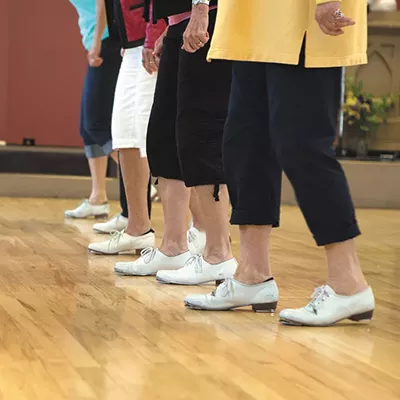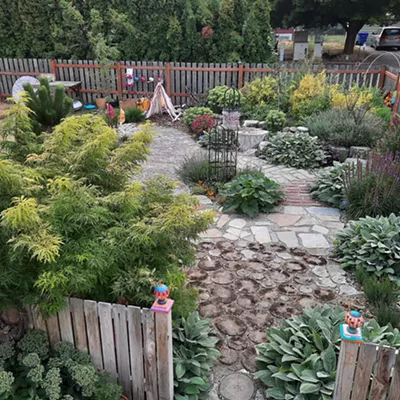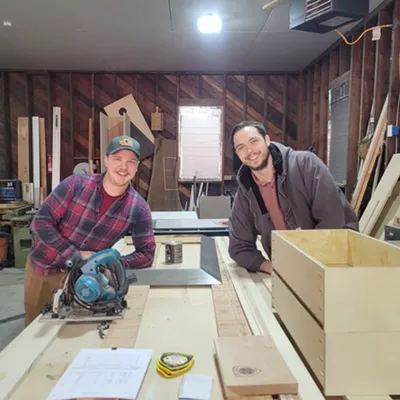
Two years ago, the morning after Thanksgiving, 83-year-old Phyllis Forster fell.
She found her sock-clad feet sliding out from under her on the bathroom linoleum, and when she hit, she hit hard. The impact broke her kneecap. She managed to pull herself to her good leg, limp over to the phone and call 911.
She's not alone. Falls are the leading cause of accidental injury and accidental death among seniors — nearly one third of those older than 65 fall every year.
Some seniors, afraid of falling, become less active, leading to weaker muscles, slower reflexes and ultimately even more risk of falling. But not Forster.
"I never was fearful," she says.
Instead, she's committed to being active. Every Monday and Wednesday, Forster attends Sit and Be Fit classes at her retirement community to work on balance and strength. Exercising isn't easy. Now 85, her arthritis can make it a little painful. But she knows taking control of her health is the secret to preventing falling in the future.
"If I don't exercise," she says, "I'm stiff as a board."
Building Strength
Spokane's health community wants to inspire more seniors to be like Forster: to understand the risks around falls, but also understand how to prevent them. In Spokane County, the rate of falls among those older than 65 is significantly higher than in the rest of the state. Lately, while emergency room visits because of falls have been decreasing, the rate of fall-related deaths has increased.
A few years ago, local groups formed the Fall Free Spokane coalition as a way to push back against the problem.
"The coalition did this project to find out: Are senior classes in the community focusing very much on balance and fall prevention?" says Gretchen Wilson, producer of Sit and Be Fit, a nationally syndicated fitness show based in Spokane that is hosted by her mom, Mary Ann Wilson. "There wasn't as much as we were hoping."
But the coalition is trying to change that, holding Balance Enhancement Training sessions for fitness instructors. "We put together a four-hour course to train instructors on specific balance skills," Wilson says. "Part of that class is broken down into basic body mechanics: posture, gait, breathing and transferring weight."
Today, senior-targeted programs, like the weekly aerobic-and-balance "Stay Active and Independent for Life" program, are held in Spokane at community centers, gyms and retirement homes. The Institute for Extended Learning provides a long list of similar classes, organized by location at iel.spokane.edu/act2.
In particular, Wilson recommends Tai Chi: The martial art's slow, focused movements targets leg strength, flexibility, range of motion and reflexes, and has been shown to reduce senior falls by up to 45 percent, according to Harvard Medical School researcher Peter Wayne.
But Wilson cautions that not every class is led with the same expertise. "It's about the instructor," Wilson says. "You want to make sure [they are] well-trained."
Identifying Risks
Every senior is different. One person may be unbalanced because of an inner ear problem, another because of weak leg muscles. Seniors may want to talk to their doctor or call home health care provider Gentiva (1-888-GENTIVA) to ask about the "Safe Strides" program. It's often covered by Medicare, and if seniors qualify, Gentiva will send a specialist to the home to examine medications, home safety and physical health: That means everything from the seniors' strength, flexibility, range of motion and gait, to the sensitivity of their feet and the health of their inner ear's vestibular system.
"You have to find out which part of it is not working," says Kym Wright, a physical therapist with Gentiva. Together, the client and specialist come up with an individual plan to fix whatever's wrong. A survey of more than 10,000 Safe Strides patients found 96 percent were able to reduce their risk of falls.
Some seniors may hesitate to seek help, brushing off a fall, or a near fall, as an isolated incident. The Spokane Regional Health Department recommends that family members broach the subject at family gatherings. Instead of focusing on the dangers of falling, they suggest family members concentrate on how their loved ones can remain active and independent by improving their strength and balance.
When seniors approach staying healthy and balanced as the secret to remaining independent, balance and strength training become a lot easier.
"This is your job now," Wilson says. "Keeping yourself functionally fit and lowering your risk for falling to maintain your freedom." ♦
How to Prevent Falls
1. Train your body: The CDC says exercise has the biggest impact on fall prevention. Here are a few tips to improve your balance, strength and flexibility.
• Stand up with your feet together, close your eyes, and remain as steady as possible.
• Set a metronome — they can be downloaded online — to 100 beats per minute and walk 10 steps, turning your head to the rhythm. The beat can improve the consistency of your gait and improve the brain's timing, a little-known influence on tripping.
• Exercise your pelvic floor by flexing the muscles that stop the flow of urine. By strengthening bladder control, you can decrease the number of those dangerous late-night runs to the bathroom.
• Ride a bike. Cycling not only provides balancing practice, it improves endurance. The Spokane Bicycle Club has around 240 members who regularly go on fast trail rides, and the vast majority of them are seniors.
• Play the Wii. St. Luke's Rehabilitation Center uses the videogame Wii Fit in their therapy. The game comes with a balance board, enabling seniors to practice their balance and have fun while doing it.
• Join a game of balloon volleyball. Such games can improve balance and reaction time. Reaction speed relies on fast-twitch fibers that be retrained, making it easier to adapt to quickly changing situations and to catch yourself when falling.
2. Improve your vision: Poor vision can literally trip you up, especially in the dark. Get your eyesight checked regularly, so you'll more easily spot that step or curb.
• When you get up at night, put on your glasses, and take a moment to let your eyes adjust before standing up.
• By looking ahead and using your peripheral vision, instead of staring at your feet, you'll retrain your eyes to sense obstacles.
• Turn on the lights — or use a night light — to make walking around the house at night safer.
3. Review your meds: The sleepy/dizzy effects can get worse when drugs interact.
• Stick with one doctor and one pharmacist. Ask them to review and help you manage your medications.
• Remembering to take the right pills at the right time can be a bit complicated, but automatic pill dispensers from companies like Lifeline can dispense cups of pills at predetermined times.
4. Fix up your house: Make sure that your space is free from dangerous obstacles.
• Exposed cords or tubing — in devices ranging from lamps to oxygen tanks — can be a tripping hazard. Throw out your throw rugs, which present a frequent trip risk.
• Install grab bars in places like the shower. A place to hold can mean the difference between a mere slip and a painful fall.























